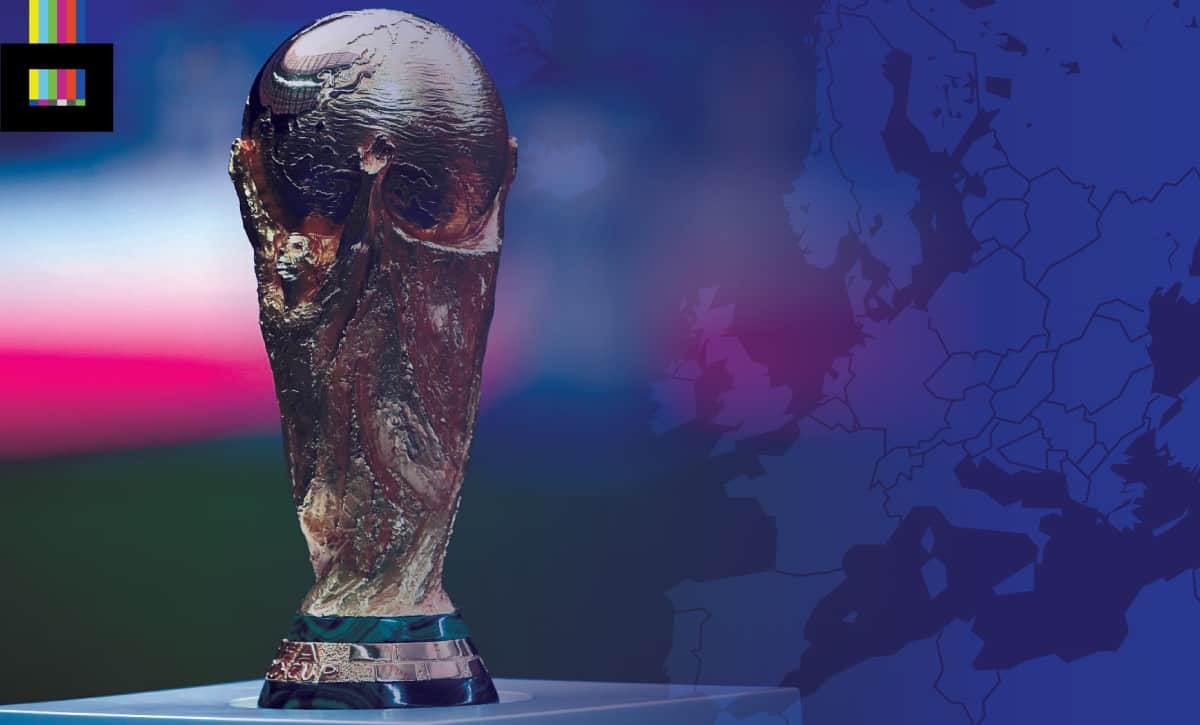
In November of this year, 13 teams hailing from UEFA begin their quest for a World Cup trophy. That means of the 32 nations represented at the World Cup, just under half come from Europe.
Europe, for its sake, is the hub of soccer in the world. It may not be the most vibrant or the most dramatic each year. However, on average, its nations are the most successful at the World Cup.
The last four World Cup winners are France, Germany, Spain and Italy. UEFA sides claim 12 World Cups, only rivaled by CONMEBOL’s nine. However, an increased disparity comes in the confederation’s placement of second, third and fourth.
European nations have 16 silver medals, 17 bronze medals and 15 fourth-place finishes. Nine finals have been contested between two European opponents.
The counter to that point would be the fact that, simply put, there are more European nations. If anything, it speaks to the ability of Uruguay, Brazil and Argentina that the number is not higher.
Now with the 2022 World Cup Qualifying wrapping up across the globe, a number of notable European teams will not travel to Qatar. One of Italy or Portugal will not qualify due to the UEFA World Cup qualifying format. The same applies to Poland or Sweden and Wales or Ukraine.
Some Europhiles want to see more UEFA teams have the opportunity to play in the World Cup. They cite that these are the best teams, and thus should be able to compete to be the world’s best. However, it would consequently take away from other federations’ abilities to produce World Cup squads.
Consistent number of European nations at the World Cup
In 2026, the number of nations traveling to Mexico, Canada and the United States for the World Cup increases. Each FIFA confederation gains additional slots in the tournament finals.
For example, the Asian Football Confederation goes from four to eight nations in the tournament. Similarly, the Confederation of African Football goes from five teams to nine. CONCACAF and CONMEBOL increase representation by three and two, respectively.
There will be 16 European nations at the 2026 World Cup, an increase of three from Qatar 2022. However, the recent omissions of Italy and the Netherlands coupled with the aforementioned absentees in 2022 sparked conversation about how Europe deserves more countries competing at the World Cup.
This close-minded view likely extends from the fact that many of the world’s, not just Europe’s, best players represent European clubs. Therefore, Europe as a whole seems like the Mecca of soccer.
International soccer and club soccer have similarities. Few would dispute that Europe is the best at both overall. Yet, when determining the World Cup winner, representation should be as balanced as possible. FIFA does its best to cater to South America and Europe, understanding that these two continents will, as history would tell, produce the World Cup winner and runner-up.
However, Europe does not deserve more teams at the World Cup finals than the allotment it already receives.
The World Cup, not the Euros
Derek Rae, a Scottish commentator well-versed in the world of international soccer, has not seen Scotland compete in the World Cup since 1998. While discussing the overall expansion of the number of teams, he commented that he supports his home nation, which used to qualify frequently for the biggest sporting competition.
He says that some parts of the world have too few teams, while others have too many.
“When it comes to the World Cup, then the world should be there… There are certain parts of the world that are underrepresented and certain parts that are overrepresented.”
WATCH: Derek Rae interview: SHOW ‘n’ TELL
There is a reason the European Championships are so exciting. The controversial expansion of teams during the 2016 tournament provided storylines like Iceland, Wales and Portugal’s eventual victory. However, we do not need to see, what could essentially be, a European Championship every two years.
Even now, of 55 UEFA members, 13 qualify for the 2022 World Cup. That is just under 24% of UEFA members competing in the World Cup tournament. Of course, that number balloons up to 29% in 2026 with the increased number of teams.
UEFA clearly holds better national teams, on average, than CAF, which has 54 members. However, only five African teams qualify for this year’s World Cup. Additionally, this African teams always provide enthusiasm and life for the tournament, like Algeria in 2014, Ghana in 2010 and Nigeria’s relative consistency of six appearances in the last seven tournaments.
Increasing the number of European nations at the World Cup would consequently take away bids from the underrepresented confederations.
Qualifying competition
CONMEBOL, the South American confederation, is the most represented continent when compared to the number of federations. There are 10 FIFA eligible members, but five have the opportunity to qualify for Qatar 2022. For the United 2026 bid, six teams from CONMEBOL will qualify for the tournament.
European fans often point out the fact that UEFA World Cup Qualifying is more strenuous than that of CONMEBOL. Only the top team in each UEFA World Cup Qualifying group gets an automatic bid, and the second-place team enters a one-off playoff style bracket against other second-place teams. There are other nuances including the Nations League that impact placement into the World Cup as well.
Yet, UEFA has one of the simpler paths to qualify for the World Cup. It is up to the nations, which often underperform, to pull out results.
For example, one of Portugal and Italy will not qualify for the World Cup despite holding FIFA World Rankings of No. 8 and No. 6, respectively. The teams that topped their qualifying groups were Serbia (ranked 25) and Switzerland (ranked 14).
Portugal lost at home in the final matchday to Serbia, allowing the Serbians to qualify automatically. Italy had four wins and four draws over its eight games. Europeans can berate CONMEBOL sides for beating up on Venezuela (ranked 58) or Paraguay (50), but the opposition in UEFA is not exactly that thrilling when breaking it down group-by-group.
Portugal, which drew and lost against Serbia, also drew against Ireland (49). Meanwhile, Italy dropped points against Switzerland twice as well as Northern Ireland (54) Bulgaria (71) in Florence.
The best players
It is a shame that Cristiano Ronaldo may miss his last chance to play at the World Cup. Or, the defending European champions led by Gianluigi Donnarumma and Jorginho will miss a second-consecutive World Cup despite winning the competition four times.

Portugal vs. Argentina, 9th February 2011
However, if their nations win the games they should, this would not be the case. Plus, their absence creates other storylines. For example, Switzerland goes to its fifth-straight World Cup after only losing in the quarterfinals of Euro 2020 on penalties to Spain. The Netherlands returns to the World Cup after missing out in 2018.
Yet, the biggest stories also emerge from outside Europe, especially when it comes to relatively obscure nations holding elite players.
Look no further than Egypt’s qualification for the 2018 World Cup. Mohamed Salah lit up a nation with his dramatic clinching of a spot in Russia. Sure, Egypt failed to pick up any points. But the World Cup sparked Egypt into joyous scenes regardless of the outcome.
James Rodriguez bust onto the scene at the 2014 World Cup. Not only did he spark his career, but he reminded the world of Colombia’s ability on the world stage.
By no means is Europe excluded from this. Croatia in 2018 surprised seemingly everyone on its run to the final with Luka Modric earning player of the tournament honors. Poland qualified for 2018, and is in a playoff for 2022, based on the heroics of Robert Lewandowski.
Rather, it is simply selfish and biased for some fans to say more European nations deserve more teams in the World Cup because those countries have better players.
World Cup 2022 and 2026
The current format of the World Cup is great. FIFA’s expansion of the tournament in 2026 likely revolves around increased earnings, which frankly makes sense for their aims and goals. It will be interesting to see how it impacts the tournament itself. The Euros and Copa America had expansions recently that faced opposing takes on their success.
If the World Cup is truly meant for the world, and not Europe, then there is no reason to increase the quantity of European teams while taking away bids from other confederations. It just comes down to whether or not the best teams with the brightest players can qualify. If they cannot, then they do not deserve to be coddled into reaching the tournament. Rather it should leave a bad taste in the mouth like it did for the Netherlands, the United States and perhaps Italy.
Yet, time will tell if Italy will face consequences of poor performances for a second-consecutive World Cup qualifying cycle.
200+ Channels With Sports & News
- Starting price: $33/mo. for fubo Latino Package
- Watch Premier League, World Cup, Euro 2024 & more
Live & On Demand TV Streaming
- Price: $35/mo. for Sling Blue
- Watch Premier League, World Cup & MLS
Many Sports & ESPN Originals
- Price: $9.99/mo. (or get ESPN+, Hulu & Disney+ for $13.99/mo.)
- Features Bundesliga, LaLiga, Championship, & more
2,000+ soccer games per year
- Price: $4.99/mo
- Features Champions League, Serie A, Europa League & NWSL
175 Premier League Games & PL TV
- Starting price: $4.99/mo. for Peacock Premium
- Watch 175 exclusive EPL games per season
110+ channels, live & on-demand
- Price: $59.95/mo. for Plus Package
- Includes FOX, FS1, ESPN, TUDN & more





















John Hartshill
April 6, 2022 at 8:31 am
There’s a simple way to do it: have the number of places based on both equality and results on the pitch. Oceania gets 1 place. Every other federation gets 3. That includes any hosts. That’s 16 places.
The remaining 32 places are decided by a 64-team tournament where the allocation is as follows: 1 Oceania, 3 CONMEBOL, 14 from each of the other 4. The remaining 4 places are given based on how many of a federation’s teams made the semi-finals of the previous tournament. That’s fair on everyone as all the 4 largest federations have exactly the same representation. It’s up to their teams to prove they deserve their place in the main tournament through inter-continental play-offs.
Buddy Grizzard
March 28, 2022 at 2:10 pm
What would it look like if WC berths were allocated as a percentage based on wins per confederation at past world cups, say since 1990 or 2000?
dave
March 28, 2022 at 4:28 pm
This is another interesting approach, along the lines of UEFA coefficients for determining number of berths in UCL/UEL. I was sufficiently curious to look at the 2018 World Cup, using average points per team earned during group stage and regular time of knockouts (i.e., extra time in a knockout gives each team 1 point), excluding the third place game. Results are not surprising, rounded to the nearest point:
.
* UEFA 8 points per entrant
* CONMEBOL 7 points per entrant
* AFC 3 points per entrant
* CONCACAF 2 points per entrant
* CAF 2 points per entrant
.
If berths were assigned proportional to total points earned in the 2018 World Cup (problematic from a chicken and egg standpoint, just illustrative), they would be:
.
* UEFA 19
* CONMEBOL 7
* AFC 3
* CAF 2
* CONCACAF 1
Yofrex
March 30, 2022 at 11:43 pm
Not possible
Ra
March 27, 2022 at 8:29 pm
I would be as happy if all participants were from Europe and the Americas. Even better if it was always hosted on either side of the Atlantic. It would be great not to see a WC in Russia or Qatar.
Michelangelo
March 27, 2022 at 7:25 am
I just hate the fact on how UEFA Groups are set up for Qualifying. It should be top two get a spot and third gets a playoff. Look at CONCACAF and CONMEBOL they have an easier task to qualify for the World Cup. Uruguay lost 6 matches and qualifies for the World Cup. However, Italy doesn’t lose 1 match in qualification and only gets second. This doesn’t make any sense at all. It’s disgusting how this method works. UEFA should integrate the same method that both CONCACAF and CONMEBOL use. If one confederation, has it then they all have it. Absolutely disgusting to see.
dave
March 27, 2022 at 2:25 pm
@Michelangelo, I am not sure a format change does much to address the core issue. UEFA is very heavy in high-quality teams relative to their allocation of World Cup slots.
.
If qualification were based on FIFA rankings (a horrible idea, just illustrative), the 2022 World Cup would be 3 AFC, 3 CAF, 2 CONCACAF, 6 CONMEBOL, 0 OFC, 18 UEFA. No matter the format, taking 13 UEFA teams guarantees a few good ones will be left out. That is the fundamental counter to Kyle’s argument for restricting the number of UEFA slots.
.
From a different angle, suppose each confederation had its current allotment but each ran its qualification on FIFA ranking (another awful idea). The lowest-ranked 2022 World Cup team by confederation would be 52 (AFC), 36 (CAF), 42 (CONCACAF), 22 (CONMEBOL), 20 (UEFA). The push for “representation” advantages CONCACAF and AFC at the expense of CONMEBOL and UEFA. Whether that trade-off is good or bad gets philosophical.
Yofrex
March 30, 2022 at 11:42 pm
Europe has the highest numbers of countries in FIFA so it’s fair the qualifiers are that way. You can’t compare UEFA with other bodies. You just have to live with it.
norman
March 24, 2022 at 2:06 pm
If I have read my notes correctly, this is what I wrote. % eligible countries belonging to a confederation is CONMEBOL 4.5, UEFA 25, AFC 21, CAF 24.5, CONCACAF 18.5, OFC 6.5. Thus, the participants in a 48 team WC would be CONMEBOL 2, UEFA 12, AFC 10, CAF 12, CONCACAF 9, OFC 3. Based upon weighted values, the participants would be CONMEBOL 5.5, UEFA 20, AFC 8, CAF 9, CONCACAF 5, OFC 0.5. This is pretty close to what it is, ignoring the play-off for 2 teAMS. i HOPE IT NOW COMES OUT CLEARER
norman
March 24, 2022 at 1:46 pm
What I wrote above is distorted in sending the text
norman
March 24, 2022 at 1:44 pm
If, like Dereck Rae, you want equality, one should perhaps base it on the percentage of all eligible countries that belong to a given confederation
CONMEBOL 10 countries ~ 04.5% Thus, in a 48 team WC, the # of teams would be ~ 02
UEFA 55 25% 12
AFC 47 21% 10
CAF 54 24.5% 12
CONCACAF 41 18.5% 09
OFC 14 06.5% 03
This would certainly produce more diversity, but what would be the overall quality of soccer. So let us weight the teams according to their current FIFA rankings, giving each country in a confederation the following weight:
FIFA ranking 01/20 – 5, 21/40 – 4, 41-60 – 3, 61/80 – 2, 81/100 – 1, 101/150 – 0.5, >150 – 0.25
Then, the weighted value for each confederation would be
CONMEBOL 39
UEFA 148.5
AFC 57.25
CAF 66.5
CONCACAF 35.75
OFC 3
Therefore, based upon these figures, the number of confederation teams in a 48 team WC would be
CONMEBOL ~05.5 FIFA 2026 06
UEFA ~20 16
AFC ~08 08
CAF ~09 09
CONCACAF ~05 06
OFC ~00.5 01
Which is pretty close to what it will be in 2026 (ignoring play-off for 2 countries)
dave
March 27, 2022 at 2:42 pm
@norman, I like the direction you are going with quality-weighting. If you have an easy to update spreadsheet, I am curious how this looks if you assign weights to FIFA ranking groups with ratios more similar to likelihood of winning if the teams were to face off.
.
For example, top 10 teams would be far more than 5:4 favorites when playing teams ranked 21-40 on a neutral field. Perhaps something like 1-10 15, 11-20 9, 21-40 5, then the balance more or less as you already have it.
Turfit
March 31, 2022 at 10:55 am
My understanding is that a World Cup is a competition of the best teams from each confederation around the world, not just the “best” teams. If it was just the best teams then it should be a competition of just CONMEBOL and UEFA. So equality from each of the confederation should be the goal. I would also prefer to merge CONMEBOL-CONCACAF and AFC-OFC so that each confederation has about the same amount of teams (UEFA 55, CAF 54, MEB-CAC 51, AFC-OFC 61). Then you could have 12 teams from each of the 4 confederation to make up the 48 team World Cup. This will also give you a team from each confederation in all groups in the group stage of the world cup.
Mercator
April 1, 2022 at 10:56 am
@Turfit – Yes! This is exactly correct I’m not sure why I had to scroll down so far to see it. Most of the world does not want to watch only Europe v. South America – it’s a world cup for a reason and it should be representative of the confederations. The problem is the confederations are unequal and in many cases make no sense. OFC and AFC should be merged, as should CONMEBOL and CONCACAF. I would not just split it by 12 though – the confederation cup winner and 9 others determined by qualifying (40 teams), and then the next 8 are top 8 FIFA coefficients who didn’t qualify. I am glad they are expanding to 48 though, all through qualifying I genuinely wanted more teams in. Italy sure but North Macedonia would have been great, and I will miss Egypt and Nigeria (and perhaps Australia).
Jasinho
March 24, 2022 at 7:18 am
I think the intention of a 48 team World Cup and UEFA’s upcoming expansion to 16 slots is so there would only be one European nation for each group in the three team group stage. Whether or not UEFA deserves the additional slots could only be proven if they don’t somehow make the round of 32.
Frankly, I could make the same arguments for CONCACAF with their six automatic spots and so on and so forth with Asia and Africa, and that is prior to the new playoff for the remaining spots in the World Cup.
This debate could be a real back and forth from those who are already fans of established footballing nations. I look at the World Cup expansion as a factor in growing the game. Italy may not have made the last World Cup, but arguably that made room for Croatia making it all the way to the final match.
dave
March 23, 2022 at 11:48 pm
I like the understatement of “FIFA’s expansion of the tournament in 2026 likely revolves around increased earnings”. I fear a move to 64 teams may not be too far behind.
.
The 2019 Women’s World Cup grouped world-class USWNT with a team that did not belong on the same pitch. The farcical game between them was an insult to the spirit of competition. The tournament would have been improved if at least one AFC bid had been flipped to UEFA.
.
Many UEFA teams (men and women) can play a competitive and watchable game even if paired against top-10 opposition. I appreciate your points about balanced representation as the number of slots increases. There should also be an objective of maximizing the number of competitive, watchable World Cup games, and UEFA is relatively safe on that dimension.